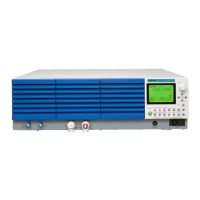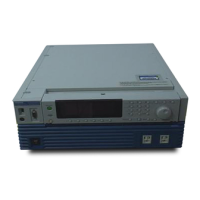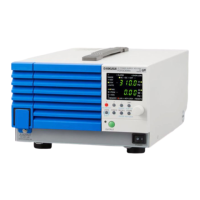Do you have a question about the Kikusui PBZ20-20 and is the answer not in the manual?
Verify all accessories are included and undamaged after receiving the product. Contact distributor if items are missing or damaged.
Follow installation guidelines regarding atmosphere, temperature, humidity, ventilation, and environmental conditions.
Connect the power cord to the AC INPUT on the rear panel and plug into a grounded outlet. Ensure correct voltage and frequency.
Steps and precautions for powering on the PBZ, including self-test and preventing load damage.
Procedure for connecting loads to the OUTPUT terminals, including terminal covers and chassis connections for proper operation.
Feature to switch voltage measurement points to sensing terminals for accurate output voltage measurement across the load.
Details on Bipolar/unipolar mode and CV/CC mode settings for defining power supply operation.
How to select and combine internal and external signal sources for generating DC and AC signals.
Configure the PBZ to generate DC voltage and current using internal signal source settings.
Set up the PBZ to generate AC signals, including waveform, amplitude, and frequency.
Overview of overvoltage, overcurrent, overheat protection, and alarm features to protect the PBZ and load.
Guidance on selecting settings, using keys, rotary knob, cursor keys, and other basic operational controls.
Explanation of preset memory and setup memory differences and primary usage for saving settings.
How to save settings to memory entries A, B, C in CV/CC modes and load them.
Save and load up to 10 sets of PBZ settings, including configuration and protection features.
Adjust rise and fall times to reduce waveform distortion or oscillation based on load conditions.
Detailed guide to CONFIG settings for operation conditions, system configuration, and interface setup.
Use sequences to automatically execute steps, update signal settings, and perform waveform simulations.
Learn how sequences are created from scripts, programs, and steps for automated output patterns.
Methods for executing sequences, including running programs or scripts sequentially or repeatedly.
Detailed instructions for editing programs, including selecting, naming, and managing steps.
Practical examples demonstrating DC signals, AC signal superposition, trigger inputs, and ramp transitions.
Control PBZ functions like DC signals, output on/off, and shutdown using signals on the J1 connector.
Magnify output current by connecting multiple PBZ units in parallel, controlled by a master unit.
Synchronize output on/off, sequence start timing, and clocks across multiple PBZ units and external devices.
Periodic inspection of the PBZ for optimal performance, including cleaning the dust filter.
Information on the internal battery, its service life, and how to contact for replacement.
Reference for default settings of operation modes, signal sources, protection, measurement, and memory.
Guidance on diagnosing and resolving common issues related to power, operations, output, and settings.
Details on available options such as rack mount brackets and vertical stands for the PBZ.
| Output Voltage | 0 to 20 V |
|---|---|
| Output Current | 0 to 20 A |
| Power Rating | 400 W |
| Weight | Approx. 6.5 kg |
| Operating Temperature | 0 to 40 °C |
| Storage Temperature | -20 to 70 °C |
| Input Frequency | 50/60 Hz |
| Line Regulation | 0.01% + 2 mV |
| Input Voltage | AC 100 to 240 V |
| Voltage Regulation | 0.01% + 2 mV |











